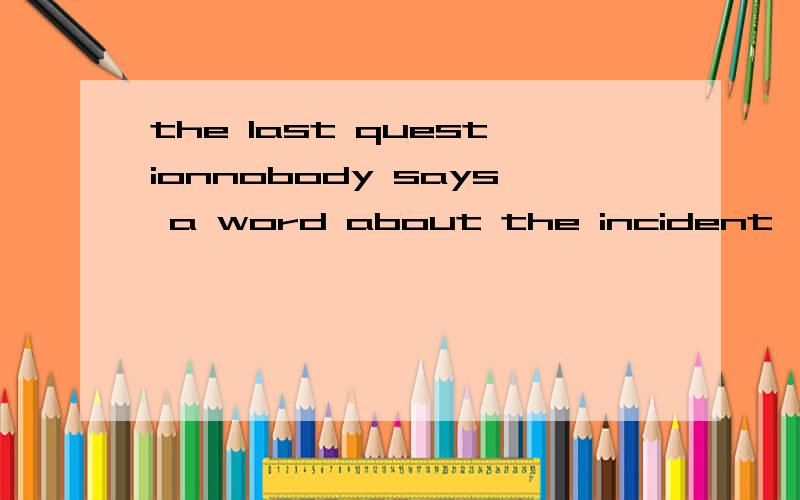the last questionnobody says a word about the incident ,____?a.does he b.doesn't he c.do they d.don't they来点解释
来源:学生作业帮助网 编辑:作业帮 时间:2024/11/26 05:57:55

the last questionnobody says a word about the incident ,____?a.does he b.doesn't he c.do they d.don't they来点解释
the last question
nobody says a word about the incident ,____?
a.does he b.doesn't he c.do they d.don't they
来点解释
the last questionnobody says a word about the incident ,____?a.does he b.doesn't he c.do they d.don't they来点解释
C.
这种句式你就记住,前面和后面表达的意思要相反,前面用肯定,后面用否定;前面用否定,后面就用肯定.nobody是否定语气,“没有人”怎样怎样,所以后面用肯定语气,这样就剩下A和C了;从词义理解,“没有人”其实意思就是“所有人”,所以肯定不是单数形式,所以答案是C.
b
以上都错,题目出得不够科学,应选a或c.在考试中就选c吧.
理由:
1.与含否定意义的词有关的反意疑问句
如果陈述部分含有never, hardly, scarcely, seldom, no, nothing, nobody, few, little等具有否定意义的词,其反问部分要用肯定式。例如:
They have never met each other ...
全部展开
以上都错,题目出得不够科学,应选a或c.在考试中就选c吧.
理由:
1.与含否定意义的词有关的反意疑问句
如果陈述部分含有never, hardly, scarcely, seldom, no, nothing, nobody, few, little等具有否定意义的词,其反问部分要用肯定式。例如:
They have never met each other before, have they?
You have nothing more to say, have you?
Few people know him, do they?
2.反意问句中如果陈述部分的主语是不定代词someone(body), anyone(body), everyone(body), no one, nobody 等,其反问部分的主语可以是they也可以是he。例如:
Everyone passed the exam, didn’t they / he?
Someone is coming, aren’t they / isn’t he ?
Anyone can see it, can’t they / he?
收起
D
c
a
C
c
答案是C
A
要明确两点
1 nobody 为单数
2 划线部分前面为否定,反意部分用肯定